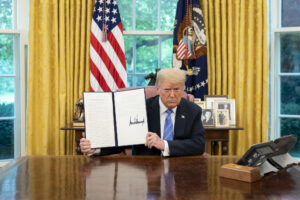This is it. It’s done, finally done. France, Germany and the whole of the European Union, with the exception of Hungary, have finally realised that by letting Vladimir Putin win in Ukraine, the 27 would soon be exposing themselves to the risk that he comes to test them in Estonia or on the Finnish border, divides them by fear of direct conflict and undermines their unity.
Better late than never, but where do we stand?
If Donald Trump is elected next November, he will quickly set about dismantling the Atlantic Alliance and reaching an agreement with the Russian President at the expense of the Europeans. This is the worst-case scenario, but even if Joe Biden were to be re-elected, the United States would no less continue to distance itself from Europe in order to better concentrate on China.
We virtually no longer have American protection and no proper defence of our own other than the single French army. Until the Atlantic Alliance breaks up and the Kremlin is thus able to triumph over Ukraine, we are left with just a handful of years to meet three major challenges.
The first is to equip ourselves with pan-European armaments industries, without which we can neither guarantee our security nor support Ukraine, nor come to the aid of any other country that we should also be protecting in order to protect ourselves.
The second challenge we face is to increase the Union’s financial resources, since we will not be able to lay the foundations for a common defence without devoting a dedicated European budget, which has yet to be created. Whether we do this by developing the Union’s own resources, by communitising part of our military spending or both, we can no longer hesitate for long.
As for the third challenge, undoubtedly the most difficult, it is to enlarge the Union while affirming within it a political union with harmonised taxation, convergent diplomacy and armed forces integrated into a common defence.
We can rise to these challenges, because necessity will make law. Pan-European armaments industries will require joint financing, calling for new common resources, and we will not be able to take these steps without both tightening and broadening our ranks. If we are to carry more weight, we must not allow hostile forces to settle on the fringes of the continent and organise them against us. We must integrate into our ranks those European States that wish to do so, but we will not be able to do this without giving the Union a heart by uniting even more deeply those of the 27 who are prepared to move towards political union.
One step will lead to another. It is not a question of embarking on endless and highly uncertain negotiations to revise the treaties, but of innovating, pragmatically, as we did with vaccines or our first common loan.
There is nothing impossible about that, but nothing can be done unless the nations of Europe want it. The debate must be opened as soon as possible, and if these European elections do not provide the opportunity, if we allow the new extreme right-wings to turn them into national elections, we will be choosing the erasure of Europe against its affirmation, its defeat against its rebirth.



